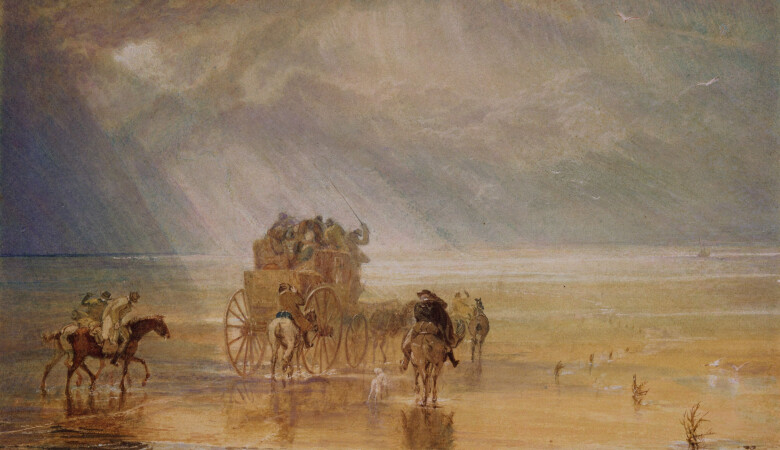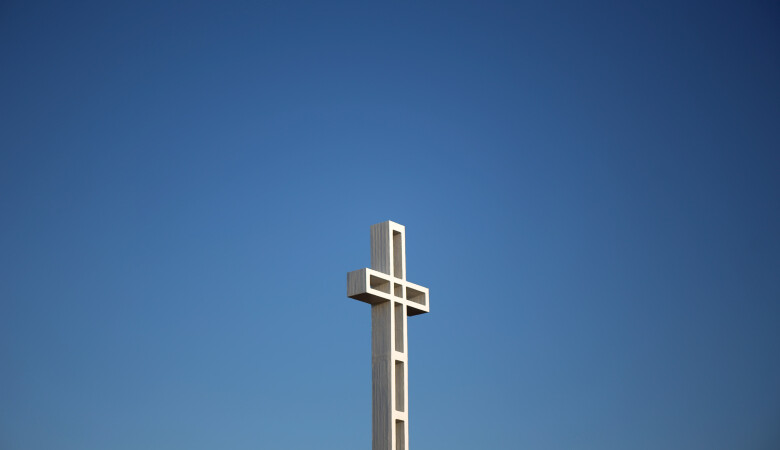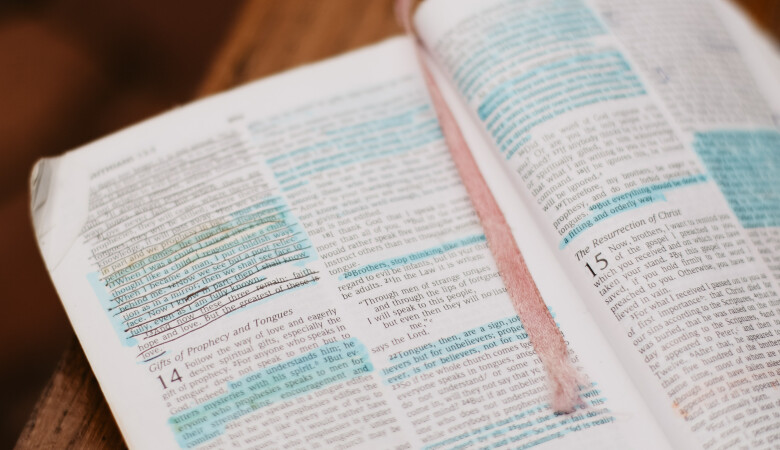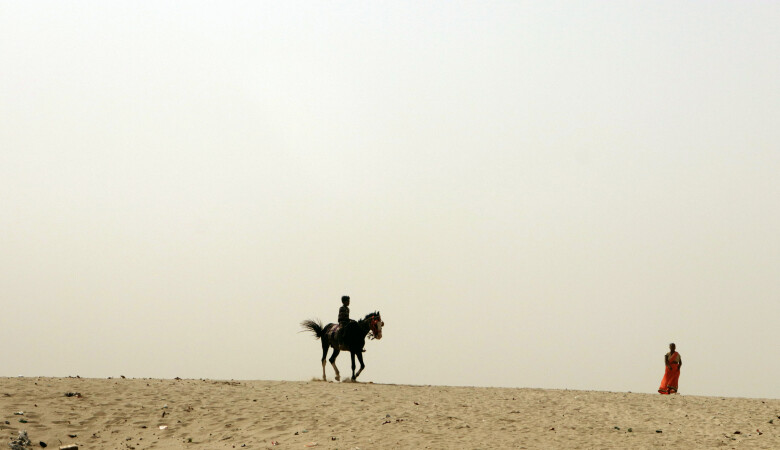The Glories That Follow Christ's Crucifixion
October 01, 2000 | Andy Davis
Psalms 22:1-31
Humiliation of Christ, Exaltation of Christ
Andy Davis preaches a verse-by-verse expository sermon on Psalm 22. The main subject of the sermon is the glories that Christ's crucifixion effects.
- sermon transcript -
Introduction
Today we're going to concentrate on the second half of Psalm 22, namely verses 22 through 31. But before we do, I want to tell you a little story that's been an encouragement to me, and it's a story of the Moravian missionaries. We have the Lovefeast every year, and that's a Moravian heritage and tradition, but even greater is their heritage and their tradition of mission work around the world.
In 1732, there were two Moravians that were the first Moravian missionaries from Herrnhut. They had heard the testimony of a slave named Anthony from the West Indies, and as they listen, they were moved in their spirit and they felt the Lord leading them to go to the West Indies as missionaries. As God worked this out, the congregation was reluctant at first to let them go, but ultimately, through the leadership of the Spirit, they embraced this mission, but they said, "You have to understand this. In order to go as missionary to the West Indies, to the slaves in the West Indies, you must become a slave yourself, it's the only way to reach him, because the people will never let them off the plantation, they work from dawn 'til dusk and then as soon as night comes they are forced to go to sleep so that they can work again the next day. If you want to have any impact on them whatsoever, you need to become a slave yourself.” Through fasting and praying they thought, "Do I want to do this?" God led them, and they did. As they were on the ship and the ship was pulling out of the harbor, there in Northern Germany and heading toward the West Indies, the two of them fell to their knees and they lifted up their hands in praise to the Lord, and said, "Oh Lamb, receive now the reward for your suffering."
It's an incredible thing that they said, and their theology is deep. I think it was from the Book of Revelation when it said, "You are worthy oh Lamb, to receive the scroll, for you suffered and died, and by your blood, you have purchased men for God from every tribe and language and people and nation." Those two Moravian missionaries are saying, "Get them, Lord." We're going to lay down our lives so that you can get the reward for your suffering, the thing that is coming to you, because you shed your blood and its people, the slaves in West Indies, receive the reward for your suffering.
The Sufferings of Christ
It got me to thinking, in 1 Peter Chapter 1, we have, though I didn't know it, a two-part outline of Psalm 22. In 1 Peter 1:10-11, Peter speaking of salvation says, "Concerning this salvation, the prophets, who spoke of the grace that was to come to you, searched intently and with the greatest care, trying to find out the time and circumstances to which the Spirit of Christ in them was pointing when he predicted," and here it is, "the sufferings of Christ and the glories that would follow." There it is, that's your two-part outline of Psalm 22. Peter's talking about Old Testament predictive prophecy, Psalm 22 is definitely included in that. The Spirit of Christ was in David when David wrote Psalm 22, and the Spirit of Christ in David a thousand years before Jesus was born was predicting his own sufferings, the crucifixion, which we saw so plainly last week. Verse 1 through 21 of Psalm 22 is the sufferings of Christ, and we saw it plainly, didn't we? We saw the crucifixion. Look at Psalm 22:12 and following. Remember verse 1, the great cry that Jesus gives us from the cross, "My God, my God, why have you forsaken me?" Jesus cries out from the cross, not only crying from his own God-forsakeness as a sin-bearer for us, but also pointing to Psalm 22. The crucifixion so plainly depicted here, verses 12-18 says, "Many bulls surround me; Strong bulls of Bashan encircle me. Roaring lions, tearing their prey, open wide their mouths against me. I am poured out like water, and all my bones are out of joint. My heart has turned to wax; it is melted away within me. My strength is dried up like a potsherd, and my tongue sticks to the roof of my mouth. You lay me in the dust of death." Verse 16: “Dogs have surrounded me; A band of evil men has encircled me. They have pierced my hands and my feet." What can this be other than crucifixion?
Verse 17, "I can count all my bones, people stare and gloat over me. They divide my garments among them and cast lots from my clothing." This is the death of Jesus Christ in prophetic perspective, predicted a thousand years before it ever came about. As I was preparing for my sermon last week and practicing, and I do practice a sermon, it was about 43 or 44 minutes in practice and I said, "They're not going to wait until 12:30 to hear this whole thing, this is two sermons." The Lord convicted me and said, "You know, you've left me on the cross. You forgot, you've got the sufferings of Christ, but you don't have the glories that follow. I didn't die just to die." Hebrews Chapter 12, "Jesus, for the joy set before him, endured the cross despising its shame." Where is the joy in this sermon? We got the suffering, but no joy. Well, it had to come this week, the glories that would follow and it's all right there in verses 22-31. The sufferings of Christ, Verse 1-21, the glories that would follow, 22-31. Listen as I read it, "I will declare your name to my brothers. In the congregation, I will praise you. You who fear the Lord, praise him. All you descendants of Jacob honor him. Revere him, all you descendants of Israel, for he has not despised or disdained the suffering of the afflicted one, he has not hidden his face from him, but he has listened into his cry for help. From you comes the theme of my praise in the great assembly. Before those who fear you, I will fulfill my vows. The poor will eat and be satisfied. They who seek the Lord will praise him. May your hearts live forever. All the ends of the earth will remember and turn to the Lord, and all the families of the nations will bow down before him for dominion belongs to the Lord and he rules over the nations. All the rich of the earth will feast and worship, all who go down to the dust will kneel before him, those who cannot keep themselves alive, posterity will serve him. Future generations will be told about the Lord, they will proclaim his righteousness to a people yet unborn. For he has done it." That's powerful.
There's a context here, of course. David was a king a thousand years before Jesus was born, a Jewish king, and the context for David was his own personal sufferings. Because he was a king he had many personal and political enemies who would have loved nothing better than to see David dead and his throne toppled. He had enemies and because of those enemies, he felt that any time his life could be forfeit, that he was surrounded by those who would kill him. But we know that David's sufferings, however great were nothing compared to the sufferings of his descendant, Jesus Christ and so at some point in Psalm 22 his prophetic language kicks in and it just gets to a higher level. There are things said that could not be true of David like “they have pierced my hands and feet,” and so he's really speaking of the sufferings of Christ. It's interesting because David in verse 25 and 26 says, "Before those who fear you, I will fulfill my vows. The poor will eat and be satisfied." It's very interesting, in that Jewish context, whenever you wanted to say thank you for something great to God, you'd go offer animal sacrifice. When the animal was killed, then there was meat, and for us who live in an age of refrigeration, eating meat is no big deal, but for them back then, the only time they ate was at a time of sacrifice. So when you kill a bull, and I'm sure David would have offered something that great, you've got to have a lot of friends to come and share. You're going to have a feast. “Come and share with me and celebrate.” That's what's going on. David has been delivered and he's going to sacrifice a thank offering and invite all of his friends to come and sit and eat, and they're going to enjoy that time. The context here in the second half is a feast, a celebration of God's deliverance. It's feast language.
There's also a context in redemptive history, as we've said, it's not just David's feast, it's not just David sufferings, that's a small dim shadow of what was coming with Jesus Christ. Christ's sufferings were complete and they were for us. David's deliverance was he wasn't assassinated or he wasn't toppled, his throne wasn't toppled. Where is Jesus' deliverance? Look at verse 19-21, he prays, "But you, Oh Lord, be not far off; Oh my strength, come quickly to help me. Deliver my life from the sword, my precious life from the power of the dogs. Rescue me from the mouth of the lion, save me from the horns of the wild oxen." This is a prayer for deliverance. In the second half, he says, he has not despised or disdained the suffering. He has heard his cry, and he's answered. David's cry was heard when he wasn't assassinated or his throne wasn't toppled. How was Jesus' cry answered? It couldn't be answered the way David's was. It says in Matthew 27, "He saved others, but himself, he cannot save." In order to save others, he must die. He must die, Jesus must die. Where is Jesus' deliverance? It's got to be the resurrection. We'll get this in Psalm 16, “You didn't leave me in the grave, Father, you brought me up out of the grave.” It's the resurrection. Where does that happen in Psalm 22? Look down at verse 21 and verse 22. See the white space in between Verse 21 and 22, there's the resurrection. We'll get it more clearly in Psalm 16, but it definitely happens. We go from grieving to rejoicing, just that quickly. He's praying for deliverance and immediately he's saying, "In the presence of the congregation, and before the brothers, I will praise you." There's the resurrection. It immediately brings my mind to Jesus' suffering in his deliverance, when on the third day, he was raised from the day.
The Glories to Come Following the Crucifixion
What did he do after he's raised from the dead? That evening, he went to see his brothers. In verse 22, we get therefore the joyful declaration of the brothers. It's a spectacular image that we have here, Jesus bringing news of the victory to the brothers. Today, the Olympic coverage will end, some of you have spent many hours, I'm sure, watching the Olympics and what's the final event in the Olympics every year or every Olympics? Traditionally, the final event is the marathon. You know that the marathon comes from the story about a Greek warrior who ran from the battlefield where the Greeks had just defeated the Persians, and he ran about 20 or some odd miles, blazing sun, full armor. He went to the people, the townspeople, and just as he was dying from the exhaustion, he said, "Rejoice, we conquer." That's the image I get on Sunday evening, that Easter Sunday morning or evening, when He comes through the walls and his brothers are there, and He says in effect, "Rejoice, I conquer and because I conquer, you will live." He's bringing the news of a victory through the walls. That's what it says in John 20:19-20, "On the evening of the first day of the week, when the disciples were together with the doors locked for fear of the Jews, Jesus came and stood among them." Right through the walls, and He said, "Peace be with you." They were overjoyed, and He showed them his hands in his side and said, "Peace be with you, as the Father sent me, I'm sending you." That's how it happened. There's an announcement of the victory, and the cost of the victory, they pierced my hands and my feet. Look, here it is, the glories that follow, right through the door, through the walls, and He comes and announces, verse 22, "I will declare your name to my brothers in the congregation. I will praise you." The first audience of the good news are the brothers, Jesus' brothers. I totally reject liberal theology, which teaches the fatherhood of God and the universal brotherhood of man. He is speaking, when He speaks to his brothers, to those who have believed in his name and received him. He's going to his disciples and of them it speaks in Hebrews Chapter 2, "In bringing many sons to glory, it was fitting that God through him and for him everything exists, should make the captain of their salvation." Perfect through suffering, the consistency of scripture on this. Suffering first, then glory. In bringing many sons to glory, it was fitting to make Christ suffer.
Do you see it? Suffering first, then the glory, but the glory isn't Christ. He had that before the foundation of the world, the glory is ours. He wins us glory through his blood. In bringing many sons to glory, it was fitting that Christ should suffer, and then it says, "Both the one who makes men holy and those who are made holy are of the same family," so Jesus is not ashamed to call them brothers. How is it that we're ashamed of Christ? He's not ashamed of us. Now, which is more... Is there more cause for us? Is there more cause for us to be ashamed of Christ or him to be ashamed of us before his Heavenly Father, which, if you know yourself truly, you know the right answer. But Jesus isn't ashamed to call you brother and so He quotes as it says in Hebrews 2, “I will declare your name to my brothers and sisters; in the presence of the congregation, I will sing your praises." Jesus comes through the doors and sings the praise of God. Wouldn't you love to hear Jesus sing? Oh, what a song of victory appears to his brothers. It's not just everybody, it may not even be everybody in this room. I hope it is, but it says in John Chapter 1, "He came to that which was his own, [the Jews], but his own people did not receive him, yet to all who received him, to those who believed in his name, he gave the right to become children of God." To those people who believe in his name and who receive him, they are children of God. Jesus also clarified this in Matthew 12, his mother and his brothers come for him, and somebody brings him word, “Your mother and brothers are here.” Jesus said, "Who are my mother? And who are my brothers?" Pointing to his disciples, He said, "Here is my mother and my brothers. For whoever does the will of God is my brother and sister and mother." If you do the will of God, you're Christ's brother, Christ's sister, and to you, He brings his declaration, rejoice, I conquer, and because I live, you also live. He comes to declare the name of his Father.
"Do you see it? Suffering first, then the glory, but the glory isn't Christ. He had that before the foundation of the world, the glory is ours. He wins us glory through his blood."
One more thing about brothers, as Jesus was raised from the dead, Mary Magdalene comes, she's crying, she's weeping and she sees Jesus, she knows it's him, and she falls at his feet, I believe and grabs hold of him, and says, "Now, look what happened? Last time I let go of you, you see, you got yourself killed, I'm never letting you go again. I'm holding on and I'm never letting you go again." She's holding on to Jesus, and Jesus says, "Do not hold on to me, for I have not yet returned to the Father." I think that's kinda interesting, “Do not hold on to me for I have not yet returned. When I return to the Father, and you come there, you can hold on to me as much as you want, but let me go because I've got some things to do.” Then he says, "But go instead to my brothers and tell them, I am returning to my Father and your Father, to my God and your God." That's what he won by dying on the cross. That's what he got for us by the suffering of verses 1 through 21,He calls us brothers and sisters. It's not a small title to be called the brother of Jesus or sister of Jesus, adopted right into his family. In his message, He declares the name of the Lord, God is compassionate, his nature, all of His attributes. That's when He comes and brings the fruit of the resurrection victory. We've seen his mercy, we've seen his holiness and his wrath against sin, poured out on Jesus at the cross. We've seen his power and raising him from the dead. We've seen his love and his compassion, and that He does not despise or disdain the sufferings of the afflicted.
Who are the afflicted? It isn't Jesus, not ultimately. His affliction was in our behalf. We're the afflicted ones. We are the ones who are afflicted, and what are we afflicted by? Death. It stands over us to mock us, doesn't it? We can't beat it. It's an undefeatable foe. We can't defeat it, so Jesus came to give us that victory. Hebrews 2:14-15 says, "Since the children have flesh and the blood, he too shared in their humanity so that by his death, he might destroy him who holds the power of death," [that is , the devil]“and free those who all their lives were held in slavery by their fear of death." Do you fear death today? Are you afraid of it? Jesus can free you from fear of death through his resurrection victory. He comes to bring you that fruit, and that's what He gives. He comes to declare the name of the Lord.
In verses 22-26, I'm including verse 22 because the brothers are Jewish, but we get another subdivision. Remember the two major divisions of Psalm 22, Verse 1-21, the sufferings of Christ, Verses 22-31, the glories that would follow. The second half of verse 22-31 breaks into two halves as well. Verse 22-26 is for the Jews. Look at verse 23, look what he says. He says, "You fear the Lord, praise Him. All you descendants of Jacob, honor him, revere Him. All you descendants of Israel." Do you see it in Verse 23? Who are these people? They are descendants of Jacob and Israel. What do you call them? Jews. We get this outline of the second half in Romans 1:16, “I’m not ashamed of the Gospel, because it is the power of God to the salvation of everyone who believes, first for the Jews, then for the Gentiles.” That's what we get, 22-26, first the Jews, 27-31, then the Gentiles, that's how it works. He's coming to the Jews first. The brothers come first in verse 22, and they're Jewish, but then he gives a commanding invitation to his countrymen, it's not just an invitation, it's a commanding invitation. Come to the feast. Come to the feast. That's what he's saying.
Remember what I told you about David, the fulfillment of the vows, there's a feast involved here, verses 25 and 26, talk about that. "From you comes a theme of my praise in the great assembly before those who fear you, I will fulfill my vows. And the poor will eat and be satisfied." There's this feast language, and in the case of the Jews, it was an important part of Jesus ministry, the invitation to come to the feast. The wedding banquet is ready. Now come, come. Matthew 22:2-3 says, "The Kingdom of Heaven is like a king who prepared a wedding banquet for his son. He sent his servants to those who had been invited to the banquet to tell them to come, but they wouldn't." They refused to come. The Jews wouldn't come. They wouldn't come to the feast. But there's a commanding invitation, and here it is, verse 23, "You who fear the Lord praise Him, you descendants of Jacob, honor Him, revere Him, all you descendants of Israel." Verse 25-26, "From you comes the theme of my praise in the great assembly before those who fear you, I will fulfill my vows." Verse 26, "The poor will eat and be satisfied." What are they going to eat? They who seek the Lord will praise him. It's a feast of praise is what it is. What's physical in the Old Testament, become spiritual in the New Testament. It's not beef we're going to eat at the wedding banquet of the Lamb, it’s praise. We're going to praise God.
It's a feast because of a number of things. It's a feast because of the lavish spread, the fact that there's lots of food. There's tremendous variety, you can't have a feast and it's all rice. There's got to be a variety and it's got to be beautiful, goblets and decanters and all that kind of thing. There was an Earl in England, Glouester, I think he was. In 1624, he gave a feast which costs half of his inheritance. To give it, he felt that a feast should not just be delicious on the palate, but dazzling to the eye. He had silversmiths and goldsmiths coming in, jewelers and other things, working on the goblets, the silverware. He had experts in decoration and in confection doing these elaborate designs of desserts and all that kind of thing. It's spreading it out. It was such an elaborate display that the guests invited were stunned and didn't eat. They just didn't eat, it was overwhelming. They stood there and looked so long that the food got cold, and then no one wanted to eat it. Don't do that with his feast. Come on and eat. That's the invitation that goes out to the Jews, “come on and eat. Take part in the feast. Don't stand on the outside, take part.” It's a feast of worship. There are three commands: praise Him, glorify Him, stand in awe of Him [verse 23], and it's a feast which satisfies. The poor will eat and be satisfied. No other feast satisfies. Do you think earthly things satisfy? Do you think that Hollywood crowd, they've got everything anybody wants, are they satisfied? This satisfies, God satisfies. He's offering a feast that will satisfy, and it's an eternal feast. Look at Verse 26, it says, “They who seek the Lord will praise him. May your hearts live forever." It's an eternal feast. It's never going to end. It's an eternal feast, and He is inviting, nay, even commanding, the Jews to come. It's so tragic that so few of them are coming.
Now, in verse 27-31, he makes confident prediction about the Gentiles. Now tonight we're going to study in Acts 28. It's the end of the Book of Acts, and the Apostle Paul is there in Rome and he is speaking to the Jews, the Jews come to him, to the Jew first, and then to the Gentile. He invites the Jews, just three days after he arrived in Rome. He invites the Jews to come and he lays before them the evidence from the Old Testament, I guarantee you he talked about Psalm 22, and I guarantee you that there was a division among the Jews. Some of them believed, many of them did not, and they started to leave and go away. After quoting that famous prophecy from Isaiah 6, "Be ever hearing but never understanding, be ever seeing but never perceiving, these people's heart has become calloused, they hardly see with their eyes, or hear with their ears, or turn, and I would heal them." Talking about the Jews and their hardness of heart, they just can't see their own prophecies. But then he says this in Acts 28:28, "Therefore, I want you to know that God's salvation has been sent to the Gentiles and they will listen." You all are gentiles, all of you who trust in Jesus, you have listened, haven't you? You have believed this message.
How did Paul know that they would listen? From personal experience? Yes, he was the apostle to the Gentiles, but he knew it from prophecy. Verses 27-31, reveals the confident assurance that the predictions[the Gentiles] are going to come. Look what it says, 27 and following, "All the ends of the earth will remember and turn to the Lord. All the families of nations will bow down before Him, for dominion belongs to the Lord and He rules over the nations, all the rich of the earth will feast and they will worship, and all who go down to the dust will kneel before Him, those who cannot keep themselves alive. Posterity will serve Him. Future generations will be told about the Lord, they will proclaim His righteousness to a people yet unborn, for He has done it." You see these predictions, these are confident predictions one after the other. We live in a time now where we've seen them come to pass. They're not all finished yet, but we've seen 2000 years of mission work. We've seen the advance that future generations have been told about the Lord, they have come and they have worshipped. First Thessalonians Chapter 1 says, "They tell how you turn to God from idols to serve the living and true God." The Thessalonians obeyed this, they turned away from their idols and they turned to God and they worshipped, and they praised.
It's all coming true. God does not speak words idly. It's all coming true. Verses 27-31 do not refer to David. Not at all. Did all the ends of the earth come and honor David? No, nothing like it. This is prophetic scripture. It's not about David, it's about Jesus Christ. Now, what is the subject of this prediction? It’s the feast, isn't it? As Jason and I were working on the outline, I said, "Now, is it a feast or is it a kingdom?" We have sometimes kingdom language and sometimes feast language, I didn't know which it was. It says in verse 27, "The families of nations are going to bow down before." That's kind of kingdom language. Verse 28, definitely kingdom language, "For dominion belongs to the Lord, and He rules over the nation." That's definitely a kingdom. But then in verse 29, "All the rich of the earth will feast." I guess it ends up being both.
After Jesus taught in the Sermon on the Mount, He came down off the mountain, and a Roman centurion came to Him. The centurion had a problem, he had a servant that he loved, and his servant was sick and probably going to die, and he came to Jesus and said, "Lord, My servant is sick, please come and heal him, or please heal him." Jesus said, "I will go to him." The centurion said, "You don't need to come. But just say the word, and my servant will be healed. For I myself am a man under authority with soldiers under me. I tell this one, 'Go' and he goes. And that one 'Come', and he comes. I say to my servant, 'Do this', and he does it." So this man came to Him, this Roman, this Gentile came to Him, broken-hearted and humble and said, "I don't deserve to have you come into my roof, and you're a King just give the word, you're a spiritual King. There's a kingdom here. Jesus is amazed at his faith. Matthew 8:10, "When Jesus heard this, He was astonished." Why was He astonished? Jesus’ mission was to the Jew, first, and then the Gentile. He said, "I was sent only to the lost sheep of Israel, later I will come to Gentiles." But now it's like the Father can't control Himself. We've got to have one Gentile convert now, who's ready for the feast. Jesus is amazed, He says, "I haven't found anyone in Israel with such great faith."
Then he says in Matthew 8:11, "I tell you the truth, [or I say to you,] that many will come from the east and the west." That's the ends of the earth folks, that's Gentiles. "Many will come from the east and the west and will take their places at the feast with Abraham, Isaac, and Jacob in the kingdom of heaven.” It's both. It's a feast in the kingdom. They rejoice in having a king that rules over them. They're glad to bow down before that kind of a king. The King actually ends up being the feast. We feast on the king and his majesty and His glory. They're coming. Do you have your place? Is your place reserved at the feast? Is there a little name card with your name on it at that feast? You don't want to miss it. Because the very next thing Jesus said in Matthew 8:12, "But the subjects of the Kingdom will be thrown outside into the darkness where there will be weeping and gnashing of teeth." The alternatives are clear in scripture, no third place. You feast at the table with Jesus or you suffer in hell forever. Those are the two choices. Take your place at the feast. Don't miss it. It's a feast in the kingdom, and the beauty is that it's a universal invitation. Look at it, there's no ethnic limitations here, Jew and Gentile alike are welcome. There's no geographical limitations here, the ends of the earth will come. There's no economic limitations, the poor will eat and be satisfied, the rich will feast and will worship. No economic limitations, no chronological limitation. Not just for one generation or two or three, this kingdom doesn't just last for a little while and go the way of all the Earth. This is an eternal kingdom, one generation will proclaim it to the next, like a relay race, one generation to the next to the next, and it's come on down to us now. The same message. No limitations, come to the feast, He's saying.
"The alternatives are clear in scripture, no third place. You feast at the table with Jesus or you suffer in hell forever."
It's a feast of conversion. It says, "The ends of the earth will remember and turn to the Lord." You can't just come as you are, if you don't have your wedding clothes, you'll be thrown outside into the darkness. You need to have Jesus' righteousness on you, that's the wedding clothing you have to wear. If you don't have the wedding garment, you can't go in. You've got to have righteousness. We talked about that in Romans, "He'll clothe you with His righteousness." You've got to have it, but He's giving it to you freely. There's no cost, just be sure you've got your wedding clothes on to come. It says that the ends of the Earth are going to remember, that means they're going to think about God who created them, and they're going to turn to the Lord away from idols [verse 27]. They're going to worship before God. Deep submission and deep joyful satisfaction comes from this.
Why is all this going to happen? Why can I stand up and tell you that this is all guaranteed? It's definitely going to happen, because of God's sovereign power. Look at the connection between verses 27 and 28. It says, "All the ends of the earth will remember and turn to the Lord and all the families of the nations will bow down before Him for dominion belongs to the Lord." My wife and my kids and I went as missionaries to Japan. If we had been going in our own strength and in our own power and with our own persuasive skills, and thought we are going to convince some Buddhist or Shinto Japanese to believe in Jesus, what do you think our success rate would have been? And what kind of pride would have been on my part to think because "I'm such a great persuader they're going to believe in Jesus." It was not in my name, I went. "For all authority in heaven and earth has been given to me, therefore, you go and make disciples. And they'll listen, because I say so." The connection between verses 27-28 is the sovereignty of God which guarantees the advance of the kingdom. They will turn and they will listen. What is the message, the Gospel message? It's a righteousness that comes from God. Verse 30 and 31, "Posterity will serve Him, future generations will be told about the Lord.” What will they be told about the Lord? "They will proclaim His righteousness. But now a righteousness from God, apart from law has been made known to which the law and the prophets testified." Here it is, a righteousness that comes from God. If you think you're going to come into that wedding banquet with your own clothes, you will not be accepted. You will not be allowed. You must take on the clothes of Jesus Christ, the righteousness by faith. You've got to turn away from your own righteousness, turn away from your own filthy rags and take on Jesus wedding clothes, He will give them to you for free, and then you'll be admitted to the feast.
Application
As we look at Psalm 22, what application do we get out of the second half? First of all, I just want you to marvel at God, just be amazed at this kind of God. This was written a thousand years before Christ. It reads like a New Testament book. It's so plain. Marvel at God's sovereign power and His foreknowledge. He knew it all ahead of time. All of it was laid out ahead of time. Secondly, I want to urge you to rejoice in God's lavish generosity. Be happy that this kind of feast is waiting for you. Be happy that if you're a Christian, your best things, all of them are yet to come. I don't care what kind of things you've experienced, or what kind of great life you've had up 'til now, if you're a Christian, the best things are all yet to come. Wait until you take your seat with Abraham, Isaac, and Jacob at the kingdom of heaven at that feast. Just wait. It's an incredible feast, a lavish feast, complete forgiveness of all sins, a transformed heart that turns to God from idols, a deeply satisfying fear of the Lord, a feast of worship immersed in God's immediate face to face presence and an eternity to enjoy. “When we've been there 10,000 years bright, shining as a sun, we've no less days to sing God's praise than when we first begun.” Never ends. Rejoice in that kind of generosity and rejoice in the wideness of God's generosity, no limitations, ethnically, geographically, economically, chronologically. They're all just an open invitation to the ends of the earth.
Thirdly, can I urge you, come and eat and be satisfied? Stop living for earthly things. Stop living for your stomach or your appetites. Live for God, let God and God alone be your feast today and the rest of the week. Next week, we'll talk about it again. Recharge your passion for God, let God be your feast. Live for God, think about God, muse on Him. Think, when is the next time I get to pray and read the scripture? When is the next time I get to do something at the command of my King? Jesus said, "My food is to do the will of Him who sent me and finish His work." That's what I love to eat. I don't care what I put in my stomach, I care about doing something for God next. Feast on God and realize that someday your deepest longings are going to be satisfied in God and God alone. He's what you get in heaven, stop laboring for things that don't satisfy. Isaiah 55 talks about this feast, "Come all you who are thirsty come to the water, and you who have no money, come buy and eat. Come buy wine and milk without money and without cost. Why spend money on what is not bread and your labor on what does not satisfy? Listen, listen to me and eat what is good and your soul will delight in the richest of fare." Don't labor for what doesn't satisfy. Don't spend your life in the things that don't matter.
Fourthly, announce this to the ends of the earth. Posterity will serve Him. Future generations will be told about the Lord. Look at Verse 22, "I will declare." Who does the declaring, Jesus? Jesus started it. Verse 22, "I will declare." Verse 31, "They will proclaim." You see? "I will declare. They will proclaim. As the Father has sent Me, I am sending you." This is your message to go proclaim. Are you proclaiming it? Have you told anyone about Jesus' last week? Are you praying for missionaries who are doing that? Are you proclaiming it? Announce it. Go out into the highways and the byways, and compel them to come to this feast. It's a great feast. So go and tell them.
One final thing, I remember the two-part outline of the sufferings of Christ and the glories that would follow. The same is true for you. Suffering first, then glory. Think back to the missionaries that went to the West Indies, what did they need to do to bring Christ to the slaves? Become slaves themselves. That's honorable, isn't it? It hurts, I'm sure. There was suffering involved. But it was worth it to them. Are you willing to suffer to take this message to the ends of the earth? Are you willing to suffer to take it to your neighbor? Suffering, first thing comes the glory.
Won't you close with me in prayer? Father, I thank You for the beauty and the perfection of Your prophetic word, a thousand years before Jesus was born, David saw it clearly though he probably didn't understand it all. I praise You, O Lord, that now looking back 2000 years ago, we can see it even more clearly. We have the word of the prophets made more certain. We thank You, O Lord, for that, and we praise You for this message. And I pray that we would feast on You today, that we would be sure that everyone that we know has a place at the wedding banquet. I pray for any here who have not reserved their place that they would by trusting in Christ alone be sure that there's their name, a little placard waiting for them a seat at the banquet. And Father, I pray for all of us who have already committed our lives to You, that we would take this message to the ends of the earth and be willing to suffer in doing it. We pray in Jesus' name. Amen.






















